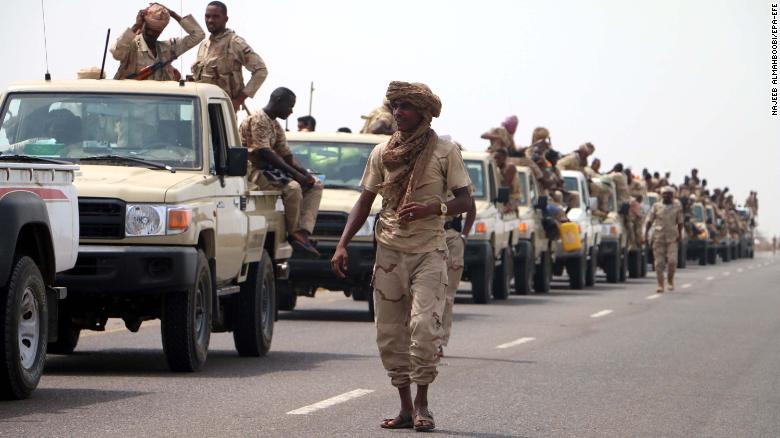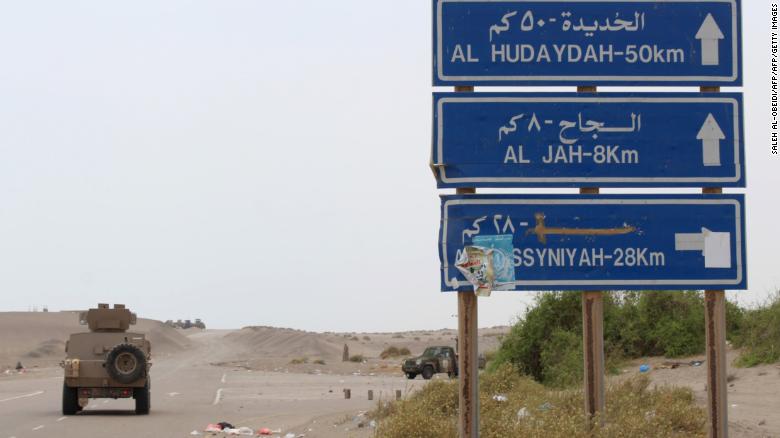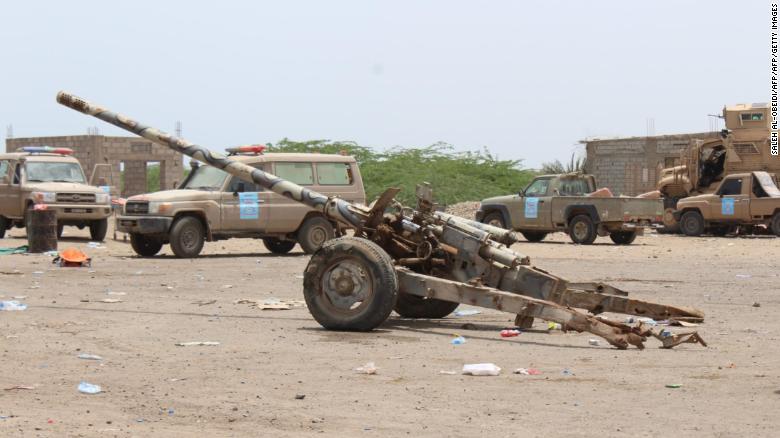(CNN)An operation to recapture the northwestern Yemeni port city of Hodeidah got underway at dawn Wednesday, potentially putting a quarter of a million people at risk.
Saudi-led coalition-backed forces launched attacks on the city's airport and other neighborhoods in the southeastern part of the city, with air force and navy support, Yemeni National Army General Mohsen Al Khosrof told CNN.
Last week, the UN said that in a worst-case scenario as many as 250,000 people could be killed in an offensive against Hodeidah.
The city, which is currently under the control of Iran-backed Houthi rebels, is considered a lifeline for the country's war-ravaged population. About 90% of food, fuel and medicines consumed in Yemen are imported with 70% of that coming through Hodeidah, according to the UN.
In a statement tweeted by Yemen's information minister, the government of Saudi-backed President Abdu Rabu Mansour Hadi hailed the offensive as "the beginning of a complete victory to liberate Yemen's territory all the way to the capital of Sanaa."
A Saudi-led coalition, which includes the United Arab Emirates, has been in a virtual stalemate with the Houthis since a coalition offensive began in March of 2015. The Houthis control parts of northern Yemen, including Hodeidah and the Yemeni capital, while Yemen's coalition-backed government controls much of the south.
The UAE, on Wednesday, called on the international community to pressure the Houthis to abandon the port.
"The international community must pressure the Houthis to evacuate Hodeida & leave the port intact. Their use of land & sea mines shows a cruel & callous disregard for Yemeni lives," the UAE's Minister of State for Foreign Affairs Anwar Gargash said in a tweet.
Saudi Arabia's ambassador to the US, Khalid bin Salman, said the offensive was "critical in light of the growing threat that the Iranian backed Houthi militia poses to the maritime security of the red sea."
In a series of tweets on Wednesday, he added: "The Houthi's continued obstruction with regards to Hodeidah is due to their use of the port to raise revenues through looting, extortion, and illegal taxation imposed on commercial ships to finance and sustain their military aggression against Yemen and neighboring countries."
Thousands of people have died in Yemen's war. In 2015, Houthi rebels took over large swathes of territory prompting a wide-scale Saudi-led military intervention. The conflict has spiraled into what the UN has dubbed "the world's worst humanitarian crisis."
On Monday, the UN Security Council held an emergency meeting on Hodeidah after the UAE asked the United Kingdom to tell aid agencies to leave the port city. The aid agencies were told to evacuate by Tuesday night.
Speaking ahead of Monday's emergency meeting, called by the UK, Karen Pierce, Britain's ambassador to the UN, said: "The important thing is that (Hodeidah) is kept open and it is kept functioning because it is the major route in for these commercial supplies."
UN Humanitarian Chief Mark Lowcock also warned about the potential consequences of an operation.
"Seven million people are completely reliant every month on food and other assistance from humanitarian organizations so Hodeidah is absolutely central to the preserving of life," Lowcock said at a press briefing on Monday.
"If for any period, Hodeidah were not to operate effectively, the consequences in humanitarian terms would be catastrophic."
However, the United States, which previously stood against the offensive, appears to have offered tacit agreement. Officials issued a statement Monday that Yemen analyst Adam Baron described as a "yellow light" for the Yemen offensive.
"I have spoken with Emirati leaders and made clear our desire to address their security concerns while preserving the free flow of humanitarian aid and life-saving commercial imports," said US Secretary of State Mike Pompeo in a press statement Monday.
Will the Houthis withdraw?
The offensive risks plunging the country into further violence as the coalition tries to wrest control of the strategic city from the rebels. A coalition takeover would tip the conflict in favor of Saudi Arabia and its allies.
"This offensive represents a huge escalation in the conflict ... a lot of it depends on how Hodeidah falls. If the Houthis dig in, this could be a bloody street battle comparable to Aleppo," Baron, the analyst, said.
But "there is the opportunity for a Houthi withdrawal and for the coalition to force a Houthi retreat," Baron adds.
"This is something that could be extremely high-risk and could cause a lot of humanitarian disruption ... there's a reason why you're seeing so much opposition in some quarters."



